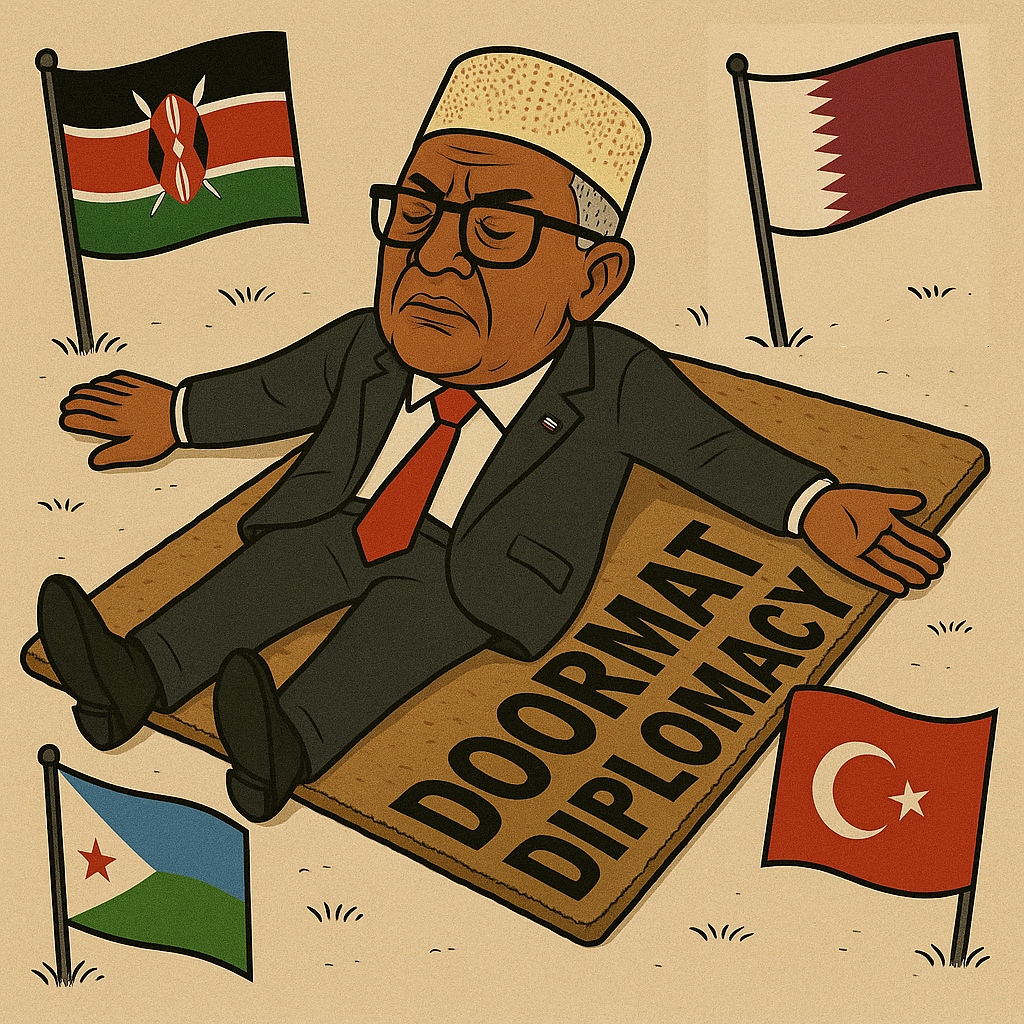The results have been devastating. Djibouti held parallel meetings with both Khatumo and Somaliland as if they were equals. Kenya offered Irro a protocol embarrassment. Qatar treated Somaliland as a mere "region" and federal state, pushing for "reconciliation" with Somalia while invoking misplaced and irrelevant Somalia's territorial integrity. Ankara rushed to sign maritime agreements with Somalia, sending Turkish research vessels to scan Somaliland waters while our government remained silent. All of this happened within Irro's first few months in office.
These are not isolated diplomatic missteps - they represent a systematic pattern of capitulation that demands urgent analysis.
The Qatar’s Bribery Disguised as Diplomacy
Qatar's sudden invitation to President Irro reveals the dangerous trajectory of our foreign policy. After realising its limited weight in the Iran-Israel conflict, Qatar is scrambling to stay relevant in the Horn of Africa. The recent visit by U.S. Africa Command to Somaliland, followed by plans to engage Ethiopia and West Africa, clearly spooked Doha into action.
Their strategy is transparent: bribe Irro's administration into slowing down Somaliland's momentum and pursuing talks with Somalia instead. The Qatar visit epitomised everything wrong with doormat diplomacy. While offering better reception than Kenya and more formal meetings than the UAE, Qatar's approach was fundamentally undermining:
- Calling Somaliland a "region"
- Treating Somaliland as a federal state
- Zero bilateral agenda
- Zero talk on trade
- Zero agreements or MOUs
- Active push for reconciliation with Somalia
- Inappropriate invocation of Somalia's territorial integrity
This wasn't diplomacy - it was a carefully orchestrated attempt to derail Somaliland's progress toward recognition.
The Turkish Maritime Threat: Sovereignty Under Assault
Yet even as Qatar was offering diplomatic humiliation disguised as engagement, a far more serious violation was unfolding at sea.
While Irro was accepting diplomatic humiliation in Qatar, Turkish research vessel ORUC REIS was conducting seismic surveys off Somaliland's coast near Berbera. This vessel operated under the Turkey-Somalia maritime agreement, giving Ankara 30-90% of revenue from exploration in what Somalia claims as its waters - including Somaliland's territorial waters.
Somaliland's silence on this violation represents a catastrophic failure of statecraft. The legal and immediate consequences are severe:
- Weakened sovereignty claims - Silence signals acceptance of Somalia's authority over Somaliland waters
- Loss of resource rights - Turkey gains the majority share of revenue from exploration near Somaliland's coast
- Geopolitical marginalisation - Reduced influence among regional powers
- Dangerous precedent - Sets the stage for future violations by other nations
The administration's response? "We work offline." This isn't working offline - it's not working at all.
The Dialogue Trap: Lessons from Kosovo
But perhaps the most dangerous aspect of this diplomatic capitulation lies not in what has already happened, but in what comes next.
The push for renewed talks with Somalia represents perhaps the most dangerous aspect of this doormat diplomacy. As Kosovo's experience demonstrates, restarting dialogue with Somalia means slamming the door on the Trump administration and any meaningful path to recognition.
It took Kosovo a decade of dead-end "dialogue" with Serbia before the world finally began recognising its independence. During those years, Kosovo's momentum stalled, its diplomatic position weakened, and its adversaries gained time to mobilise opposition. Somaliland cannot afford to freeze its quest for recognition again, especially when the Trump administration has shown unprecedented openness to realist foreign policy approaches.
Roots of Doormat Diplomacy
These systematic failures - from Qatar's condescension to Turkey's violations to the looming dialogue trap - all stem from a deeper conceptual problem.
The problem isn't just diplomatic inexperience - it's conceptual. Somaliland's foreign policy elite have embraced a mindset shaped by decades of NGO education, donor dependency, and liberal idealism. They act as if international legitimacy is granted through politeness and patience rather than power and principle.
This doormat diplomacy is rooted in constitutive theory - the idea that a state only exists if others say it does. This fundamentally contradicts declarative theory, which defines statehood based on actual governance, population, and territory. Somaliland's new elites, steeped in NGO-driven interpretations of international law, have been conditioned to seek approval from institutions like the UN and AU, both of which have repeatedly failed Somaliland.
This dependency creates intellectual paralysis. Instead of advancing bold, strategic goals, our leaders speak in empty slogans and wishful thinking.
Challenging the Recognition Caste System
This intellectual paralysis manifests most clearly in the psychological subordination that doormat diplomacy breeds.
Doormat diplomacy's most insidious effect is psychological: it conditions Somaliland's leadership to accept an imaginary hierarchy that places recognised autocrats above unrecognised democrats. This recognition-based caste system has no foundation in international law and represents the ultimate triumph of form over substance.
Under declarative theory, statehood depends on territory, population, government, and capacity to enter relations - not external validation. Every state is the ultimate authority on its territory, regardless of recognition status. Yet doormatism leads our leaders to defer to regimes that lack the most basic element of legitimacy: popular consent.
Consider the absurdity: President Irro, elected by 6 million Somalilanders, sits across from Qatar's Emir, who rules 300,000 citizens that have never voted for their government. In the Horn of Africa and greater Middle East, only Israel and Somaliland can claim leaders chosen through genuine democratic processes. Why should a democratically elected president accept subordination to hereditary rulers and appointed autocrats?
If international relations require hierarchy, let it be based on legitimacy, not recognition. Doormatism inverts this logic, elevating failed states above functioning ones and inherited power above popular mandate. The result is a morally perverse system where diplomatic etiquette matters more than democratic governance.
Somaliland's acceptance of this phantom hierarchy represents doormat diplomacy at its worst. Recognition may affect diplomatic protocols, but it cannot diminish the moral authority that comes from genuine popular mandate. Our leaders must remember: they carry the legitimacy of 6 million votes - a democratic foundation unmatched in their region.
The Waddani Awakening: Internal Resistance Emerges
Encouragingly, this psychological subordination is not going unchallenged.
Remarkably, the most honest criticism of this disastrous foreign policy trajectory is coming from within Irro's own Waddani party. Several Waddani supporters have begun expressing honest criticism of the current approach, recognising that blind loyalty serves neither the party nor the nation.
This internal awakening represents hope. When supporters demand accountability rather than offering blind trust, it creates space for course correction. The choice is clear: hold leadership accountable and stay vigilant, or risk naive complicity in Somaliland's diplomatic marginalisation.
Realism: The Essential Alternative
This growing internal resistance points toward the solution: a fundamental return to realist principles in foreign policy.
Realism, the school of international relations that prioritises national interest and power over idealistic cooperation, is not just applicable to Somaliland - it is essential. Unrecognised countries do not have access to the tools of liberalism: no seat at the UN, no aid from the AU, and no backing from multilateral treaties. But realism doesn't require permission. It relies on facts on the ground.
Since 1991, Somaliland has achieved more in terms of stability, elections, development, and peace than Somalia has in the same period - with no external help and no recognition. Federal Somalia, even with formal recognition, does not control its own territory, let alone Somaliland. In realism, this discrepancy is critical: recognition is about power, not legal theory.
Realism sees the Somaliland-Somalia question not as a moral dilemma, but as a strategic choice. Much like Taiwan and China, or North and South Korea, the two entities are locked in an enduring conflict with no foreseeable resolution. The world must choose. Somaliland must force the question: What does your country gain from Somaliland - and what does it lose by siding with Somalia?
Trump and the Realist Opportunity
The timing for such realist clarity could not be better.
This is why Donald Trump's foreign policy represents a historic opportunity for Somaliland. His rejection of aid-driven diplomacy, focus on bilateral partnerships, and "America First" ethos align perfectly with what Somaliland needs: a relationship based on shared strategic interests, not empty pledges.
With Berbera's geostrategic value rising and the Horn of Africa's importance in Indo-Pacific strategy, Somaliland can offer the United States and its allies access, stability, and leverage. But to do so, we must act as a partner - not a petitioner.
The Legal Foundation Remains Strong
This realist approach does not abandon legal arguments - it simply refuses to depend on them exclusively.
While legal arguments around the Somalia-Somaliland union still hold value, realism does not depend on them. What matters is Somaliland's actual sovereignty, proven stability, and strategic importance. The idea of state continuity - that Somaliland simply reverted to its 1960 independence - serves as a safeguard, not the main argument.
Academic literature consistently highlights that the union was never legitimately established. The African Union's own fact-finding mission in 2005 confirmed this assessment, though the organisation failed to act - a shortcoming that underscores the limitations of multilateral institutions.
What's at Stake
The path forward is clear, but the window of opportunity is rapidly closing.
President Irro inherited a peaceful and stable country with unprecedented international momentum toward recognition. Yet in mere months, his administration has undermined Somaliland's position more than any external actor ever could. This isn't just a change in leadership - it's a change in doctrine, from assertive realism to passive doormatism.
The world is watching. The adversaries are mobilising. Qatar is offering bribes disguised as diplomacy. Turkey is violating our waters while we remain silent. Somalia is preparing to drag us into another decade of meaningless dialogue.
Somaliland must choose: act with clarity, confidence, and realism - or fade into irrelevance, one polite handshake at a time

